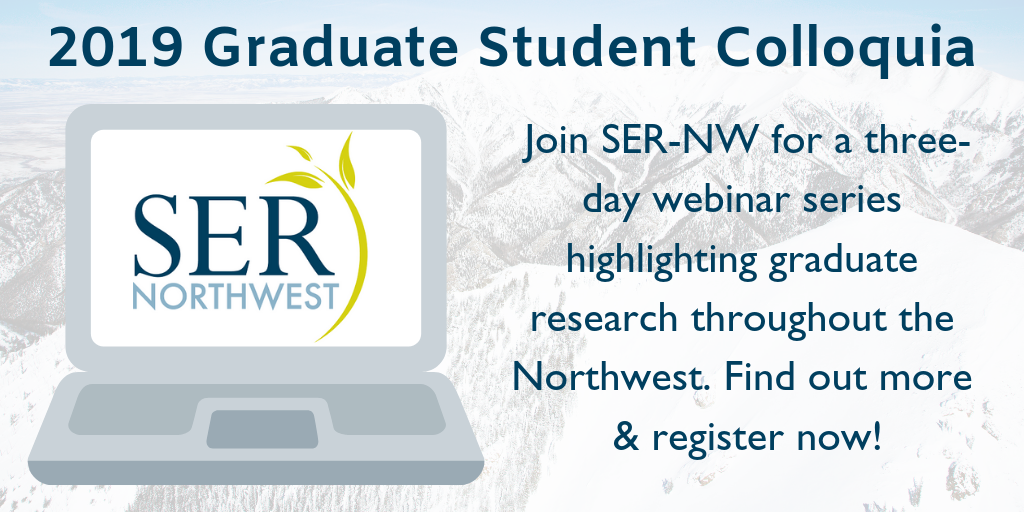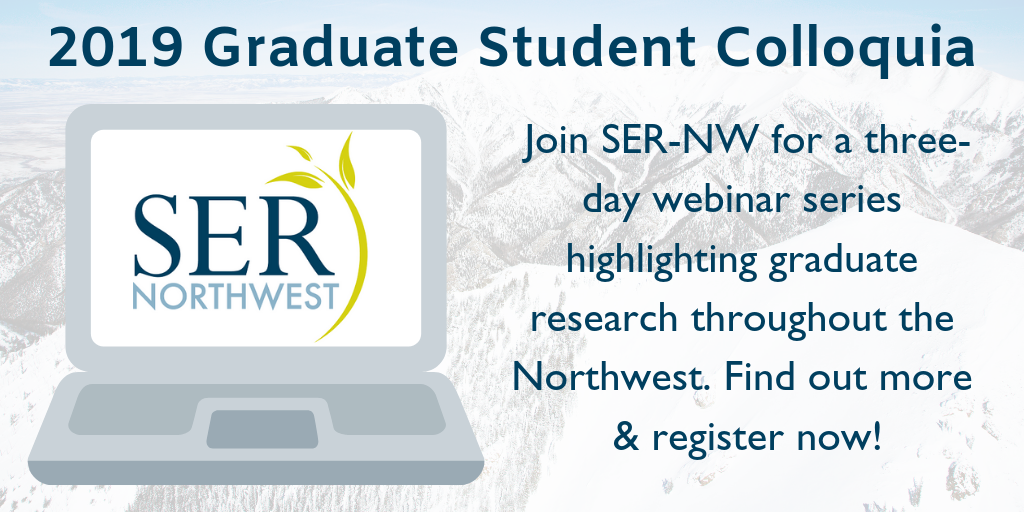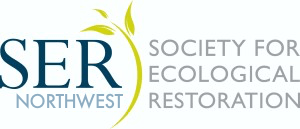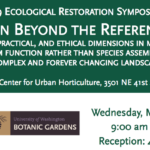 The SER-NW 2019 Graduate Student Colloquia: Day 1
The SER-NW 2019 Graduate Student Colloquia: Day 1
Mon, Feb 25, 2019 11:00 AM – 12:00 PM PST
Register Here: https://register.gotowebinar.com/register/2715752335870807297
Nicollete Nelson – Assessing the effects of meadow restoration on Sierra Nevada amphibians using eDNA
Managers in the Sierra Nevada are increasingly restoring degraded wet meadows in order to recover essential ecosystem services (e.g. water storage and carbon sequestration) and to benefit native wildlife. These projects may increase available habitat for federally-listed amphibians, but some projects have unintentionally prompted the spread of invasive species that negatively impact native amphibians through predation, competition, and disease. Rare amphibians, early-stage invasive colonizers, and pathogens are difficult to observe using traditional survey methods, so we used environmental DNA (eDNA) to determine the net impacts of wet meadow restoration on sensitive amphibians. Our results suggest that wet meadow restoration in the Sierra Nevada has not directly benefited sensitive amphibians.
Rachel Turba de Paula – Use of Museum Material to Reconstruct the Extirpated Fauna of the Los Angeles River
After extirpation of species in their natural habitat, museum samples are usually the only potential source of DNA. For restoration plans to be successful, we need to clearly understand what has been lost. Museum material stored at the Natural History Museum of Los Angeles County will be used to investigate extirpated populations of unarmored threespine stickleback, a species of freshwater unionid clam, as well as an extinct and endemic species of shrimp. In this chapter, we will investigate the success of different protocols on extractions of formalin-fixed material, dried tissues and shells, which can secondarily be extended to a hybridization capture approach for genome sequencing. Results will be used to answer questions about relationships between extant and extirpated populations and should clarify options for appropriate restoration of the Los Angeles Basin.
The SER-NW 2019 Graduate Student Colloquia: Day 2
Tuesday, Feb 26, 2019 9:00am – 10:30am PST
Emma MacDonald – Community Science for the 21st century, a tool of Environmental Justice Emma MacDonald is currently a graduate student within IslandWood and Antioch University’s Urban Environmental Education program. This program is a novel approach to traditional Environmental Education pedagogy, emphasizing environmental leadership, social justice, and expanding place-based experiential learning to include the built environments of our cities. Emma has a background in conservation research and ecological restoration through several positions across Oregon, Washington, and Hawaii. Emma’s webinar presentation will focus on utilizing community science (formerly known as citizen science) as a tool for the environmental justice movement; mobilizing communities to become involved with all aspects of planning, research, and implementation of results to effect positive and sustainable change.
Scott Davis – Mapping Urban Ecosystems: an Asset Management Approach to Environmental Stewardship Urban natural spaces go beyond just parks, such as storm water detention ponds, urban creek systems, boat slips, and vegetated reservoirs. The positive function and value provided by urban ecosystems is often overlooked or minimized as a result of existing degradation and disconnection. This project developed an effective process for mapping and evaluating ecosystem assets on public property in an urban environment. The project focuses primarily on the evaluation and digital mapping of a) vegetation , b) tree canopy, c) habitat functions, and d) management needs. This pilot project is being conducted on property owned by Seattle Public Utilities (SPU), a public utility operated by the City of Seattle that provides fresh water delivery, solid waste management, as well as drainage and waste water management. The project includes field data collection, map and inventory creation, field data analysis, and recommendations for the study sites, including an in-depth recommendation for one highlighted site.
The SER-NW 2019 Graduate Student Colloquia: Day 3
Wednesday, Feb 27, 2019 9:00am-10:30am PST
Register Here: https://register.gotowebinar.com/register/4965692875394182145
Caitlyn O’Connor – Variation in perceptions of the stormwater social-ecological system in Puget Sound: insights for management across the land-sea interface
I will investigate the perceptions of the impacts of non-point source pollution (stormwater) on the marine ecosystem in Puget Sound, Washington by eliciting regional expert opinions’ in the stormwater science and management realm. Specifically, my objectives are to: 1) Describe variation in the ways stormwater experts perceive the structure of the Puget Sound stormwater social-social ecological system. 2) Explore the consequences of differences in variation in perceptions in the stormwater social-social ecological system for management. 3) Develop a consensus model of the Puget Sound stormwater social-ecological system that can be used to support management decisions. These objectives build off one another to end with a tool that will hopefully enhance our understanding of the impacts of emerging contaminants (stormwater), improve our knowledge of the transport of pollutants in the Puget Sound ecosystem, and preliminarily evaluate the perception of how much recovery needs to happen.
Ashley Bagley – How can Floodplain Restoration Enhance Streamflow and Salmon Habitat in the Stillaguamish River?
This project builds upon the Stillaguamish Tribe’s traditional knowledge and collaborations with Snohomish County to predict where floodplain restoration can provide the greatest increase in salmonid habitat by amplifying groundwater-surface water exchange. Our study includes five areas within the North and South Forks had warmer temperatures than side channels and tributaries. Further statistical analysis is needed to identify specific reaches that would create the most beneficial salmonid habitat. The Stillaguamish Tribe and Snohomish County will be able to use the study results for future hydrologic modeling of groundwater-surface water interactions using collected water quality data, and in the evaluation of large wood installations planned for 2019.

 The SER-NW 2019 Graduate Student Colloquia: Day 1
The SER-NW 2019 Graduate Student Colloquia: Day 1
